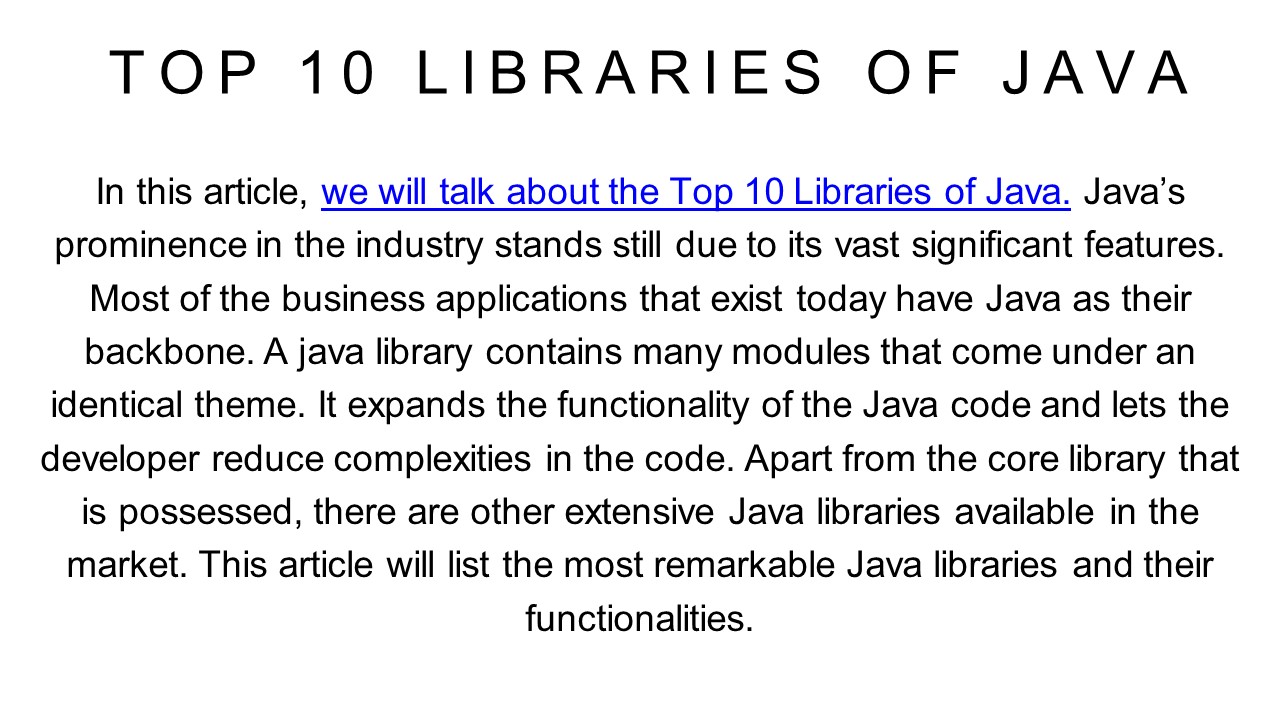Top 10 Libraries of Java - PowerPoint PPT Presentation
Title:
Top 10 Libraries of Java
Description:
– PowerPoint PPT presentation
Number of Views:1
Title: Top 10 Libraries of Java
1
TOP 10 LIBRARIES OF JAVA
In this article, we will talk about the Top 10
Libraries of Java. Javas prominence in the
industry stands still due to its vast significant
features. Most of the business applications that
exist today have Java as their backbone. A java
library contains many modules that come under an
identical theme. It expands the functionality of
the Java code and lets the developer reduce
complexities in the code. Apart from the core
library that is possessed, there are other
extensive Java libraries available in the market.
This article will list the most remarkable Java
libraries and their functionalities.
2
JAVA TOP 10 LIBRARIES
- 1. Java Standard Library
- The Java Standard library is the most popular
library as it comes with the programming language
itself. Many people fail to notice the importance
and robustness of the standard library present in
Java. Some of the standard libraries include - The java.util class consists of all the data
structures and collections in it. - java.lang is the most basic library that lets us
use many functionalities like various data types
in the program code. Thus, if you want to add the
String, Int, Double, or any other datatype, you
must include the java.lang library.
3
- 2. Apache Commons
- Apache Commons is a general-purpose library or in
other words, an open-source project that consists
of reusable Java components. Some of the most
popular ones are - Commons BSF
- Commons CSV
- Commons Crypto
- Commons IO
- Commons Numbers
- Commons Text
4
- 3. Google Guava
- The Google Guava library is an alternative to
Apache Commons. It is also a General-purpose
library that contains various core Java
libraries. It was initially developed by Google,
and later many engineers contributed to its
growth. Guava has unswervingly been one of the
most popular Java libraries. It is categorized
into three heads such as - Google Collections Library
- Basic utilities Implements common methods and
functions. - Miscellaneous utilities provides features for
productivity
5
4. Mockito When it comes to Unit/integration
testing, the concept of mocking is a much more
familiar one. In mocking, we can easily test a
single class that depends on heavyweight classes
or external functionalities such as Database
operations or I/O operations. This is done by
mocking the behavior of the other external
Service calls and focusing only on the class that
we need to test. The developers can test double
objects or dummy objects for behavior-driven and
test-driven behavior. Irrespective of the size of
the project, a popular mocking library is
Mockito. With simple API, it provides an
effective result during Unit/integration testing.
6
5. JUnit Another popular testing framework is
JUnit. As the name suggests, the developers can
easily run unit tests using this framework. Any
bug or error must be eradicated from the unit
level, therefore being proficient in unit testing
is crucial.
6. Jackson libraries In the process of software
development, it is common that we would come
across data in various formats. The data must be
loaded or saved in various formats or
transferring of data from one format to another
must take place. JSON makes this task easier to
accomplish as it acts as de facto. There are
other data formats like CSV, BSON, CBR, Avro,
XML, YAML, Protobuf, etc.
7
7. JAXB The full form of JAXB is Java
Architecture for XML binding. It is an XML
parsing library that lets us bind XML schemas and
Java presentations. As the Java Standard Library
in Java 9 does not support XML functionalities,
this led to the adoption of separate libraries
like JAXB to serve the purpose.
8. HttpClient The Java Development Kit or the
JDK does not support HTTP requests. Therefore, to
implement HTTP connections, the java.net package
is preferred. The other third-party libraries
like Apache HttpClient and HttpCore are not
simple to use.
8
9. Log4j 2 Various logging libraries in Java
like java.util.logging, Log4j, Log4j 2, and
Logback are available. The last two libraries
like Log4j 2 and Logback are comparatively
powerful. In the case of large projects, the
logging libraries may perform as expected.
10. DBCP The full form of DBCP is Database
Connection Pool Library. In most cases, the
software is developed in many languages or
platforms. Rare is software that is limited to
one language or platform. In the former scenario,
we need to integrate the databases in Java
applications. This is where the role of the
Database Connection pool libraries is vital.
9
CONCLUSION
Developing large projects entirely from scratch
without implementing the libraries would seem
like a reinventing wheel in the modern era.
Therefore, it is essential to know the libraries
that can minimize the workload. I hope this
article gave you a proper insight into what a
library is and a brief idea about the popular
Java libraries.































